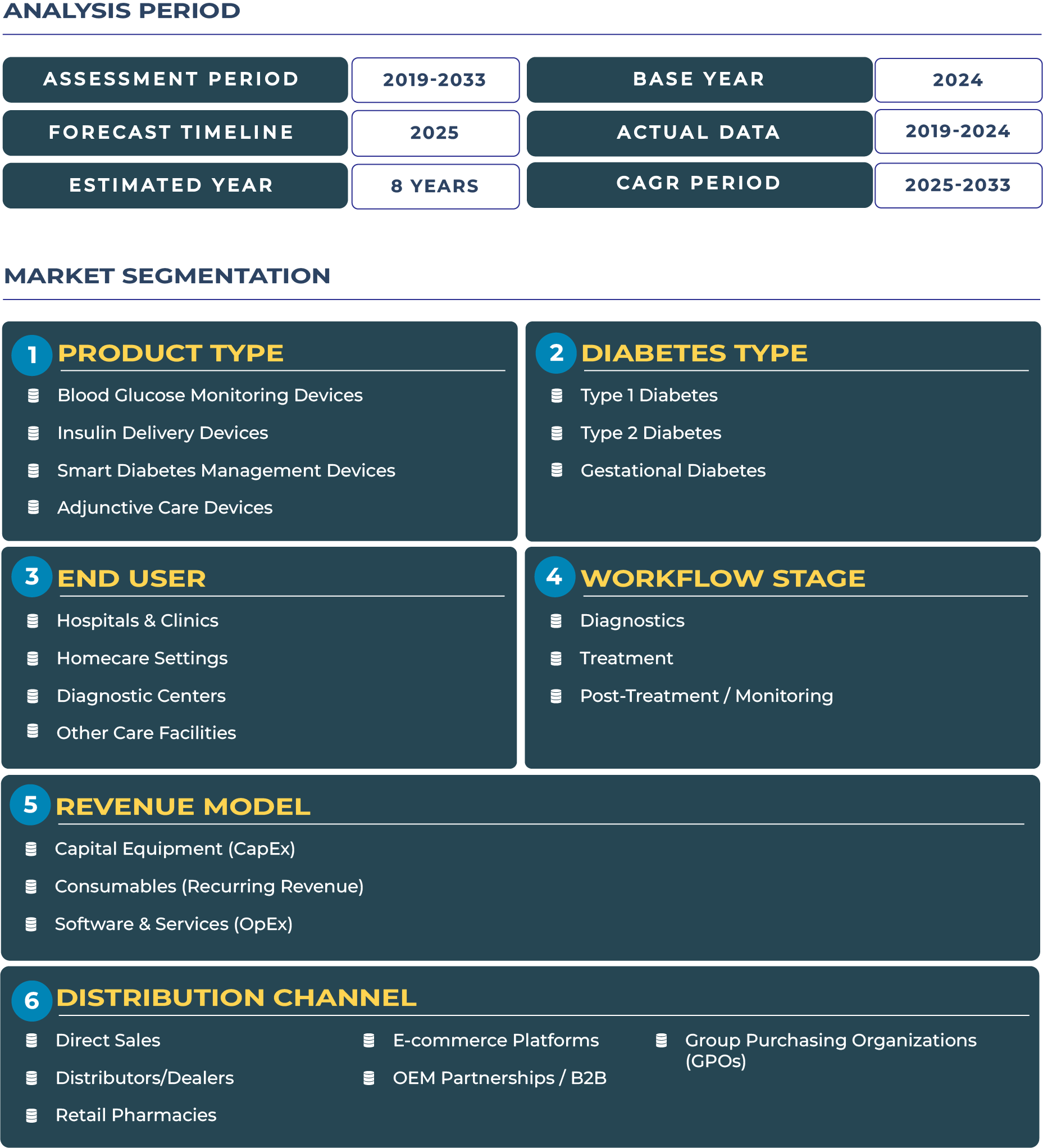Kuwait Diabetes Care Devices Market Outlook: Expanding Private Healthcare Pilots and D2C Opportunities Driving Moderate Growth in Kuwait diabetes care devices Sector
Kuwait’s healthcare landscape is uniquely shaped by the dual focus on premium private hospitals and a significant expatriate population, creating an ecosystem where the diabetes care devices market thrives on differentiated channels. Private hospitals act as the primary procurement hubs, while direct-to-consumer (D2C) offerings for expatriates open parallel revenue streams. This dual-channel dynamic positions the diabetes care devices sector as a critical enabler of chronic care management in a market where high per-capita healthcare spending meets structural constraints of size and public funding.
The Kuwait diabetes care devices industry is projected to grow from USD 23.4 million in 2025 to USD 30.7 million by 2033, representing a CAGR of 3.4%. This steady expansion reflects the increasing importance of private hospital pilots, bundled premium offerings, and the rising demand for CGM devices and connected insulin delivery systems among expatriates. Despite its modest scale compared to larger GCC counterparts, Kuwait maintains strong healthcare purchasing power, enabling selective adoption of advanced technologies. Growth is reinforced by high per-capita healthcare expenditure, alignment of hospital procurement strategies with chronic disease programs, and the growing influence of telehealth platforms integrating smart diabetes management devices. The diabetes care devices ecosystem in Kuwait is thus evolving into a premium-focused and channel-specific market with consistent growth potential.
Drivers & Restraints: Structural Healthcare Strengths Balanced by Market Size Limitations
Premium Private Hospitals and High Healthcare Spend Fueling Device Uptake
Kuwait’s healthcare sector is supported by premium institutions such as Ministry of Health Kuwait licensed private hospitals, which act as leading adopters of advanced CGM and insulin delivery devices. With one of the highest per-capita healthcare expenditures in the region, Kuwait prioritizes the adoption of innovative devices that improve long-term patient outcomes. Expats seeking premium chronic care services often turn to private providers, creating additional opportunities for device manufacturers to introduce bundled solutions with telehealth integration. Together, these factors amplify demand within a concentrated but high-value market.
Small Market Scale and Limited Public Budget Expansion Constraining Growth
Despite strong purchasing power, Kuwait diabetes care devices sector is constrained by structural limitations. The overall population size restricts market scalability, with adoption primarily concentrated in urban private hospitals. Moreover, public budget allocations are increasingly stretched due to fiscal sensitivities linked to oil price fluctuations, which restricts broad public-sector investment in advanced devices. Reimbursement gaps and limited public procurement windows further delay widespread adoption of insulin pumps and adjunctive diabetes devices. As a result, growth in Kuwait remains steady but lacks the acceleration seen in larger GCC markets.
Trends & Opportunities: Expat-Centric Healthcare and Premium D2C Models Shaping the Kuwait Diabetes Care Devices Industry
Expatriate Demand Driving Adoption of Premium Diabetes Management Devices
Kuwait’s large expatriate population has created a distinct trend in healthcare consumption, with growing demand for advanced diabetes care solutions outside of public sector programs. Expat patients often pay out-of-pocket for premium CGM devices and insulin delivery systems, seeking convenience and real-time monitoring. This trend is particularly evident in urban centers like Kuwait City, where private clinics and pharmacies act as distribution hubs for smart diabetes management products. The rise of digital-first expatriate healthcare models is further stimulating adoption in this segment.
Opportunities for Direct-to-Consumer Premium Offerings in Diabetes Care Devices
Unlike markets that rely heavily on public procurement, Kuwait offers unique opportunities for direct-to-consumer models, particularly in premium device categories. Companies are increasingly exploring bundled offerings that combine CGM devices, telehealth consultations, and mobile app integration for expat patients. These D2C offerings not only bypass procurement delays but also align with consumer preferences for convenience and self-management. As digital channels expand, this segment presents strong growth potential within Kuwait diabetes care devices landscape.
Competitive Landscape: Strategies Targeting Private Hospitals and Expat-Focused Channels
The Kuwait diabetes care devices sector is influenced by both global leaders and regional distributors who strategically target private hospital channels and D2C markets. Global companies such as Medtronic and Abbott are actively expanding their presence through premium device launches tailored to Kuwait’s high-value healthcare sector. Local distributors are collaborating with private hospitals to pilot advanced insulin delivery systems and CGM devices, while simultaneously offering expatriates access to devices via retail pharmacies and digital platforms. For instance, premium product bundles integrated with mobile diabetes management platforms are gaining traction in 2024–2025 as Kuwait hospitals test pilot programs for chronic care integration. The competitive landscape is therefore defined by strategies that blend hospital partnerships with D2C outreach, creating a dual growth model well suited to Kuwait’s healthcare ecosystem.







